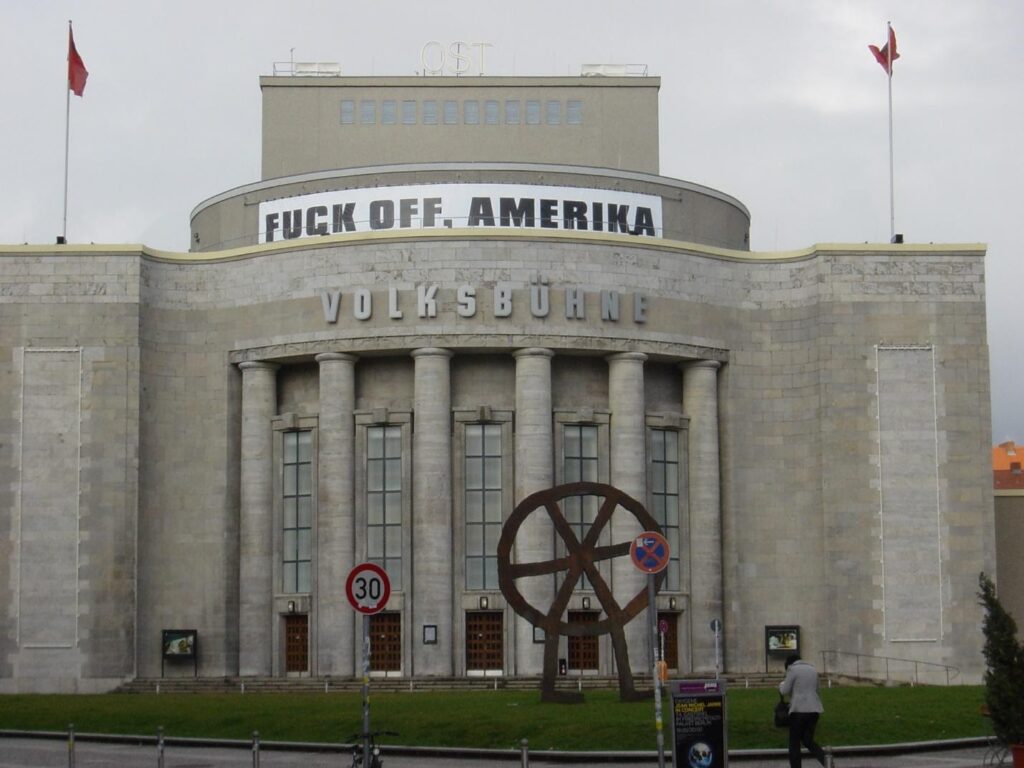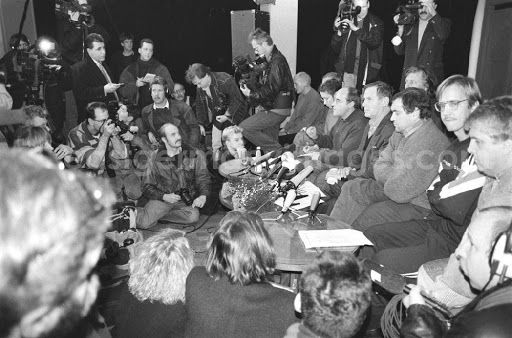
As a new year brings a new presidential administration to the helm of government in the political tinderbox of the United States, the Multicultural Germany Project is delighted to feature the latest entry in our Mission Possible commentary series on the purpose of German Studies from Christine Korte, one of our international collaborators at York University in Toronto, Canada. Korte writes that the tenure of Berliner Volksbühne director Frank Castorf, known in Germany as something of a contrarian iconoclast, offers a sterling example of the potential of creative spaces like the theater to instigate productive, culturally oppositional tensions that give voice to the contradictions of our present moment on both sides of the Atlantic.
My answer to the question “Why German Studies today?” revolves around German theatre, which has long held the status as Germany’s foremost cultural institution for Kritik. By virtue of its history, the German theatre is uniquely equipped to investigate our current social and political impasses resulting from the return of nationalism and illiberalism.
In the late 18th century, the German national theatre was conceived as an Ersatz for the democratic revolution underway in France. For Lessing and Schiller, the theatre was to become the designated public space for fueling democratic ideals and for an “aesthetic education” in bourgeois morality. This historic role underwrites today’s amply funded German Staatstheater. It provides rebellious artistic spirits with an institutional tradition to both invoke and challenge, as well as a state-funded space for exploring dissenting politics and ideas. As with German historiography, it is surely possible to talk about a Sonderweg in German theatre.
The Berliner Volksbühne is an example of the German theatre’s critical social function. Located at Rosa Luxemburg-Platz in the former East, the neoclassical building stands imposingly over its vicinity close to the Alexanderplatz. The Volksbühne (People’s Stage) originated as part of the socialist-leaning historic workers’ theatre movement of the late 19th century, granting Berlin’s industrial workers access to affordable high-quality theatre. The historic Volksbühne had its most shining period in the mid-1920s under the left-wing avant-garde director Erwin Piscator. After the fall of the Berlin Wall and under artistic director Frank Castorf (1992-2017), the Volksbühne was an example of the way the German theatre played a unique and unparalleled role in post-Wende society.
In the early 1990s, Castorf repurposed the theatre institution to fuel a cynical response to German unification: to the West’s ideological and economic “colonization” of the former East and to the euphoric proclamations of liberal capitalism’s victory over socialism. While most theatres in the former GDR used the bourgeois canon to promote the official unification narrative, the Volksbühne constituted a radical exception by refusing the “end of history”. The theatre established a counter-public around its OST identity and scathingly critiqued a smug West German society impervious to its own contradictions.
Castorf saw it as his duty as artistic director of a state-funded theatre to address the discontents wrought by the Wende: the rise of the far right in the former East, unemployment, and disenfranchisement. He provoked journalists and audiences alike with gestures that foregrounded the contradictory impulses at play in postsocialist society: a large Stalin picture hanging in his office; the Volksbühne’s Russian orientation and flagrant anti-Americanism; hosting lectures by Žižek and Badiou, as well as the “Idea of Communism” conference; and Castorf’s transgressive exploration of far-right intellectuals including Jünger and Schmitt.

At various points during Castorf’s tenure, the Volksbühne housed a hunger strike for the far-left PDS political party, a homeless theatre troupe, and had skinheads in the audience. During his tenure, Castorf also provided a space for other provocateurs such as the late director Christoph Schlingensief, whose approach to social issues such as the refugee and migrant crises is sorely missing today.
As a striking example of the return of history, the Querdenker Bewegung—a cross-section of anti-liberal stances towards the German government’s COVID containment measures—used the Volksbühne’s front lawn to stage its protests. The image recalls Castorf’s reception of the historic Volksbühne as archive and his frequent mining of its site-specific history towards the end of the Weimar Republic when all manner of illiberal extremes tried to utilize the theatre’s environs for their purposes. With consciousness of this history, Castorf felt compelled to make the tensions between liberal democracy and illiberalism visible.
Adorno once asserted that liberal democracy was the only political system in which the avant-garde could flourish. By extension, it is the only system in which a figure such as Castorf can exist. Moreover, Castorf’s uncompromising approach to the German stage was, ultimately, a defence of the spirit of liberal democracy. Because of its own Sonderweg, German Studies should draw on the example of the Castorf-era Volksbühne and fully assert its own critical, diagnostic, and prognosticating power at this crucial moment in history.
While we wait for theatres to reopen, Germanists can use their online teaching forums to ignite the archive, invigorate historical consciousness, and draw inspiration from the enduring and reliably complex and even problematic Berlin avant-gardes in these pandemic times.


